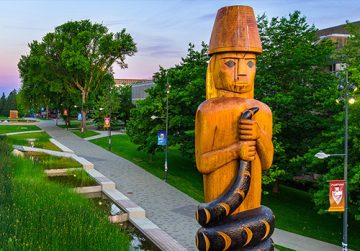
sʔi:ɬqəy̓ qeqən (double-headed serpent post)
Brent Sparrow Jr., Musqueam
This section offers information on a selection of Indigenous initiatives undertaken by the university over the past decade or more, including feature and archived stories on Indigenous topics from across the institution.
UBC Vancouver’s overall commitment to meaningful relationships with Indigenous communities and organizations begins with our acknowledgement of the traditional territory of the Musqueam, upon which the Vancouver campus is located.
As our colleagues from Musqueam frequently remind us, the land upon which the Vancouver campus sits is unceded, that is, it was never surrendered to Canada or British Columbia through a treaty or other means (a circumstance more common in British Columbia than in the rest of Canada).
And it is worth remembering that Musqueam traditional sites exist throughout the area now occupied by UBC buildings, and that the university’s arrival here marked the final alienation of these lands from Musqueam use and control.
In recent years, UBC has taken steps to acknowledge Musqueam’s long ties to the land it controls. For instance, the Vancouver campus now has three student residences with Musqueam names, each one acknowledging an important site within its traditional territory. Other markers acknowledging Musqueam presence include the sʔi:ɬqəy̓ qeqən (double-headed serpent post), also known as the Musqueam Post, which welcomes all visitors to the university, and the House Post of qiyǝplenǝxʷ (Capilano).
These are just three among others. Further, it is now routine to acknowledge Musqueam territory at UBC events, and to have members of the Musqueam community join us on special occasions, in addition to representation on relevant committees.
These and other initiatives reflect our important relationship with the Musqueam, to where we are now shaping a shared history through present-day actions, one that we are proudly building, acknowledging and sharing with the world.
UBC has formal affiliations with both the Musqueam Indian Band and the Okanagan Nation Alliance, and many other forms of relationships with these and other First Nations and other Indigenous communities and organizations. Some relationships, such as these affiliations, operate on a university-wide level, while others exist between individual programs, researchers, students, and communities and organizations. Many other types of connections exist as well with Indigenous communities and organizations throughout the world.
Where Musqueam and other First Nation students were once excluded through various means from higher education, an increasing number of them are here now, including a diversity of Indigenous faculty, researchers, and other staff. For instance, at UBC Vancouver, Indigenous student enrolment increased 50% across all levels from 2009 to 2018, as did increased services and supports to them. And the number of tenured and tenured-tracked Indigenous faculty has more than doubled over the same period. The number of Indigenous units established has increased, as well.
To a great extent, these developments and more can be attributed to the university’s 2009 Aboriginal Strategic Plan, which was replaced by the Indigenous Strategic Plan in 2020. The commitments and initiatives associated with those two plans stem from the university’s broader commitment to Indigenous engagement, first articulated in its Place and Promise plan and again in its Shaping UBC’s Next Century plan.